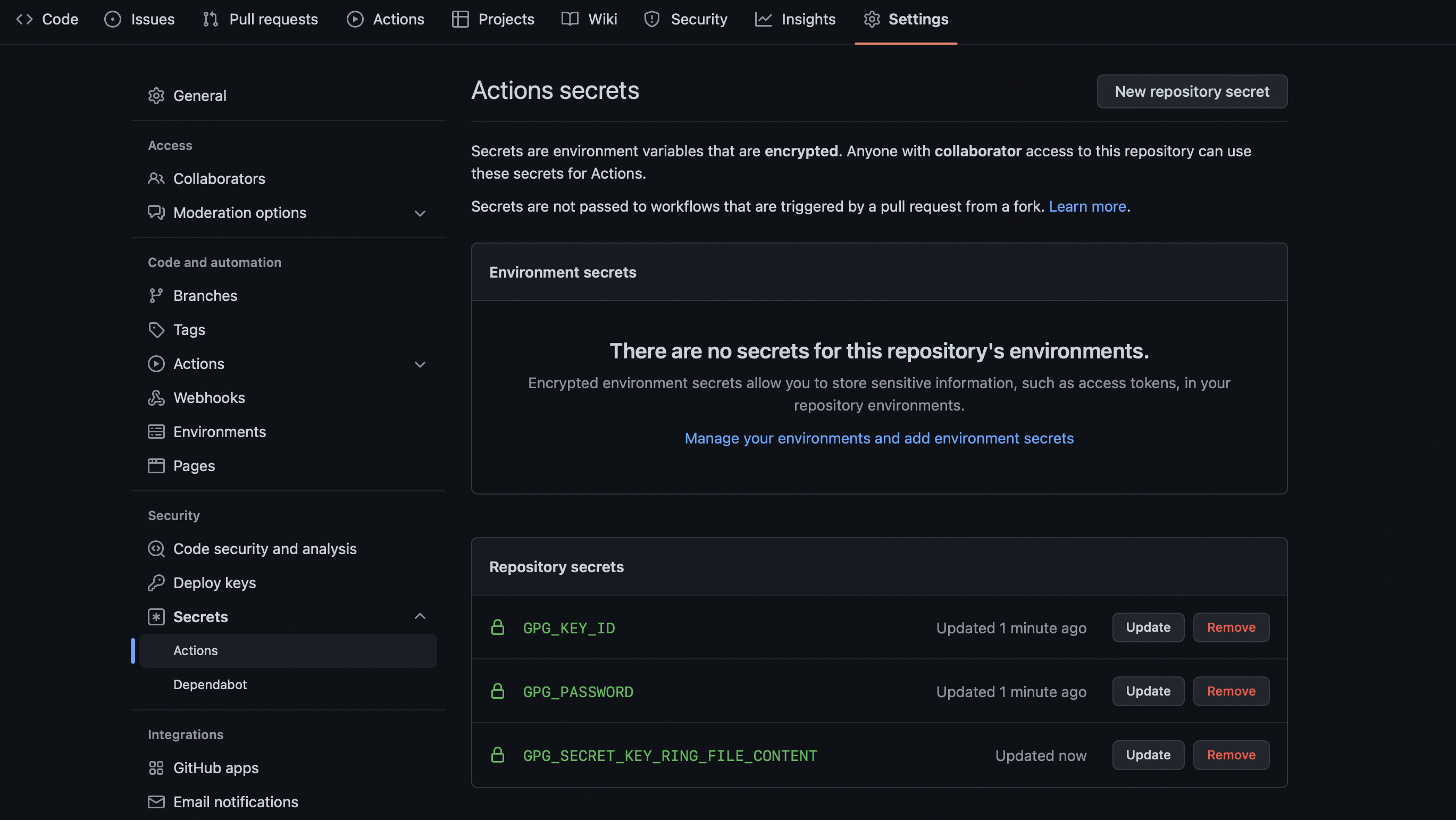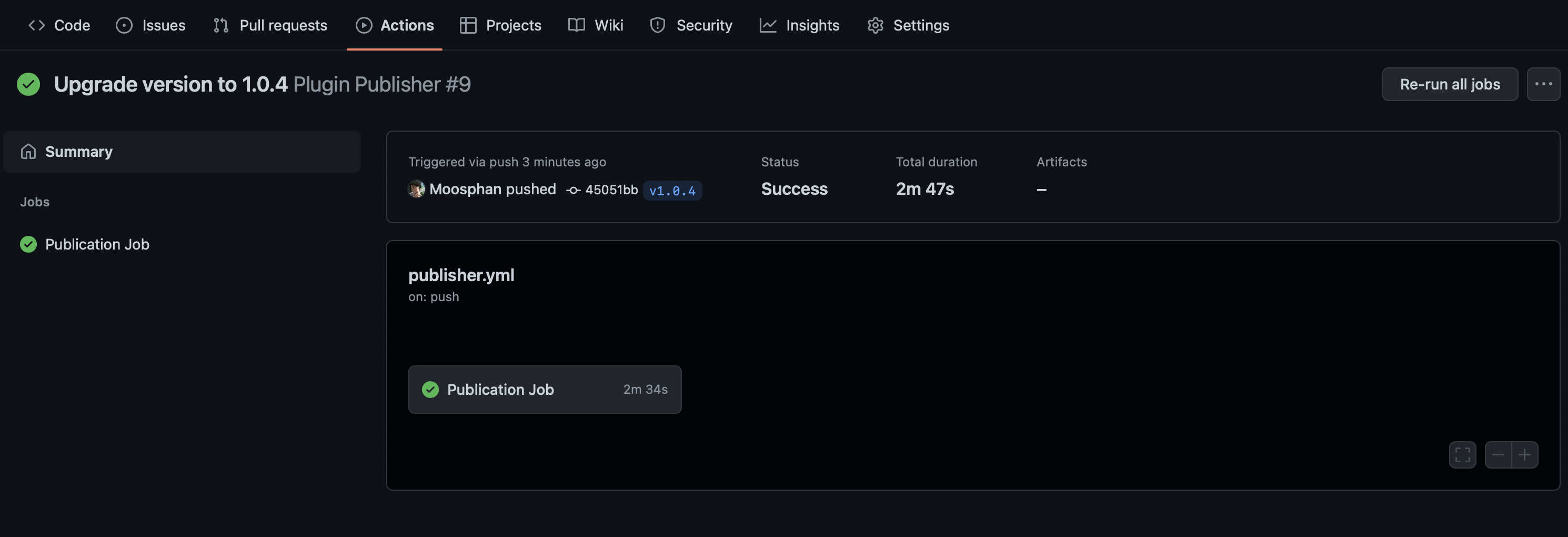在关于发布Gradle插件到Maven开放仓库的碎碎念一文中简单介绍了如何发布一款 Gradle 插件到 Maven Central。虽说最终发布只需要本地执行 ./gradlew publishPlugins 命令即可快速发布完成,但每次发布都需要区分本地和远程仓库的环境差异,然后手动配置。举个最简单的例子:我不希望本地敏感信息上传到远程仓库中,所以,每次执行完发布操作还需要手动擦除敏感信息,还是比较麻烦的。另外,有没有一种方式可以完全解放双手,甚至不需要执行上述命令然后等待其漫长地发布过程呢?自然是存在的,就是本文要介绍的 GitHub Actions。
概述
谈及 GitHub Actions,很多人应该都不陌生,它是 GitHub 提供的一套 CI/CD 平台,为广大开源贡献者提供持续集成、测试和交付部署的能力。在这里,我们希望它能够实现自动帮我们发布插件,通过类似 push / PR /TAG 等事件来触发其运转。此外,当切换到本地工作环境后,同样能够通过执行 gradle 命令来手动发布,无需额外配置。
修改本地 Gradle 配置
首先,我们发布插件过程涉及到若干隐私信息,如远程仓库用户名、密码、加密key和secret等,如果是本地发布,我们一般将隐私信息存放在 local.properties 以保证不会误提交到远程代码仓库中;如果是远程环境,借助于 GitHub Actions env variables,我们可以从当前的系统环境中读取暂存的隐私信息,并用作发布使用。所以,我们将 Plugin 模块的 build.gradle.kts 修改如下:
1
2
3
4
5
6
7
8
9
10
11
12
13
14
15
16
17
18
19
20
21
22
23
24
25
26
27
28
29
30
31
32
33
34
35
36
37
38
39
40
41
42
43
44
45
46
47
48
49
50
51
52
53
54
55
56
57
58
59
60
61
62
63
64
65
66
67
68
69
70
71
72
73
74
75
76
77
78
79
80
81
82
83
84
85
86
87
88
89
90
91
92
93
94
95
96
97
98
99
100
import com.android.build.gradle.internal.cxx.configure.gradleLocalProperties
plugins {
`java-gradle-plugin`
`kotlin-dsl`
`maven-publish`
id("com.gradle.plugin-publish") version "1.0.0-rc-1"
}
// Load and configure secrets of publication.
ext["signing.keyId"] = null
ext["signing.password"] = null
ext["signing.secretKeyRingFile"] = null
ext["gradle.publish.key"] = null
ext["gradle.publish.secret"] = null
ext["ossrh.username"] = null
ext["ossrh.password"] = null
// We can get secrets from local.properties or system env.
val localPropsFile = project.rootProject.file(com.android.SdkConstants.FN_LOCAL_PROPERTIES)
if (localPropsFile.exists()) {
val properties = gradleLocalProperties(rootDir)
if (properties.isNotEmpty()) {
properties.onEach { (key, value) ->
ext[key.toString()] = value
}
}
} else {
ext["signing.keyId"] = System.getenv("GPG_KEY_ID")
ext["signing.password"] = System.getenv("GPG_PASSWORD")
ext["signing.secretKeyRingFile"] = System.getenv("GPG_SECRET_KEY_RING_FILE")
ext["gradle.publish.key"] = System.getenv("GRADLE_PUBLISH_KEY")
ext["gradle.publish.secret"] = System.getenv("GRADLE_PUBLISH_SECRET")
ext["ossrh.username"] = System.getenv("OSSRH_USERNAME")
ext["ossrh.password"] = System.getenv("OSSRH_PASSWORD")
}
java {
sourceCompatibility = JavaVersion.VERSION_1_8
targetCompatibility = JavaVersion.VERSION_1_8
withJavadocJar()
withSourcesJar()
}
group = PluginInfo.group
version = PluginInfo.version
pluginBundle {
website = "https://github.com/Moosphan/component-publisher"
vcsUrl = "https://github.com/Moosphan/component-publisher.git"
tags = listOf("component publication", "publish library", "maven-publish", "android-library", "kotlin-library")
}
gradlePlugin {
plugins {
create(PluginInfo.name) {
// Note: We need to make here id as same as module name, or
// it will publish two different plugins.
id = PluginInfo.id
implementationClass = PluginInfo.implementationClass
displayName = PluginInfo.displayName
description = PluginInfo.description
}
}
}
dependencies {
//...
}
afterEvaluate {
publishing {
publications {
create<MavenPublication>("mavenPub") {
group = PluginInfo.group
artifactId = PluginInfo.artifactId
version = PluginInfo.version
from(components["java"])
pom {
//...
}
}
}
repositories {
maven {
val repoUrl = if (version.toString().endsWith("SNAPSHOT")) {
"https://s01.oss.sonatype.org/content/repositories/snapshots/"
} else {
"https://s01.oss.sonatype.org/service/local/staging/deploy/maven2/"
}
url = uri(repoUrl)
credentials {
username = this@afterEvaluate.ext["ossrh.username"].toString()
password = this@afterEvaluate.ext["ossrh.password"].toString()
}
}
}
}
}
可以看到,我们首先判断当前项目工作空间是否存在 local.properties 文件,如果存在则优先从中读取发布的账户和密钥信息,如果不存在该文件,一般是在远程工作空间内(Android项目的 .gitignore 文件会自动录入 local.properties 文件,不将其列入 git 管辖范围),如此一来,我们只要从环境变量中读取上述信息即可。但前提是我们在仓库的 Settings » Secrets » Actions 处录入密钥等信息:

发布 Action 脚本实现
其实,远程自动发布也无非是克隆一份与本地类似的工作环境而已,然后从 GitHub Environment variables 中读取发布所需账户和密钥信息,最终同样执行发布命令即可。相对来说比较简单,更多的还是参照 GitHub Actions 官方提供的文档,这里直接附上脚本代码:
.github/workflows/publisher.yml
1
2
3
4
5
6
7
8
9
10
11
12
13
14
15
16
17
18
19
20
21
22
23
24
25
26
27
28
29
30
31
32
33
34
35
36
37
38
39
40
41
42
43
44
45
46
47
48
49
# A workflow service to setup and publish my plugin.
name: Plugin Publisher
on:
push:
tags:
- '*'
# Allows you to run this workflow manually from the Actions tab.
workflow_dispatch:
# Custom webhook event provided to trigger action execution by network request.
repository_dispatch:
types: [publish]
jobs:
publish:
name: Publication Job
runs-on: ubuntu-latest
if: github.repository == 'Moosphan/component-publisher'
env:
GPG_SECRET_KEY_RING_FILE: $/secring.gpg
steps:
# Checkout to source code repo.
- name: Checkout
uses: actions/checkout@v2
# Set up java env with specific version and distribution.
- name: Set up JDK-8
uses: actions/setup-java@v2
with:
distribution: 'zulu'
java-version: '11'
# Prepare signing for publication.
- name: Set up signing
run: |
echo "Generate GPG private key file in $GPG_SECRET_KEY_RING_FILE"
echo $GPG_SECRET_KEY_RING_FILE_CONTENT | base64 --decode > $GPG_SECRET_KEY_RING_FILE
echo "GPG private key created succeed."
# Publish plugin into Portal.
- name: Plugin publication
env:
GPG_KEY_ID: $
GPG_PASSWORD: $
GRADLE_PUBLISH_KEY: $
GRADLE_PUBLISH_SECRET: $
OSSRH_USERNAME: $
OSSRH_PASSWORD: $
run: |
echo "Start publish plugin on Maven Plugin Portal."
echo "Load secret gpg file: $"
echo "The release version is: ${GITHUB_REF_NAME}"
./gradlew clean :publish-plugin:publishPlugins -S --no-daemon
这里我是通过本地 push tags 的时候触发 GitHub 上的插件发布任务,每次 push 代码到远程分支之后,执行 git tag v1.0.x & git push origin v1.0.x 即可触发脚本的执行了,执行完成就可看到以下成功状态:

相关参考
- https://docs.github.com/cn/actions
- https://2bab.me/2021/05/09/trap-of-maven-central-publish
- GitHub Actions security guides
许可协议: 署名-非商业性使用-禁止演绎 4.0 国际 转载请保留原文链接及作者。